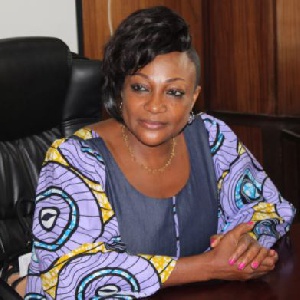 Minster for Gender, Children and Social Protection, Otiko Afisa Djaba
Minster for Gender, Children and Social Protection, Otiko Afisa Djaba
Minster for Gender, Children and Social Protection, Otiko Afisa Djaba has stated that poverty should not be an excuse for parents and guardians to indulge in child trafficking.
She said her ministry is working hard with all stakeholders and agencies to deal ruthlessly with persons who are caught engaging in child trafficking.
The Minister made this comment at the press briefing of the first Annual U.S.-Ghana Child Protection Compact (CPC) Partnership High-Level Consultation in Accra last Wednesday.
“Our ministries are committed to investing Ghana’s resources to fulfill the objectives of the CPC Partnership to ensure Ghanaian children are not subjected to forced labour or sexual exploitation,” the minister said.
The meeting was held between Ghanaian government representatives, including Ignatius Bafuor Awuah, Minister for Employment and Labour Relations; the Deputy Minister of Justice, Joseph Kpemka; and a representative from the Ministry of Interior; U.S. Ambassador to Ghana, Robert P. Jackson; and Kari Johnstone, acting Director, U.S. State Department’s Office to Monitor and Combat Trafficking in Persons (TIP Office).
Johnstone said: “We are pleased to partner with Ghana and we offer our continuing support for this unique partnership; the first of its kind in the world.”
Many children are vulnerable to human trafficking due to economic hardships in Ghana, and some are subjected to forced child labour within Ghana in fishing, domestic service, street hawking, begging, pottering, quarrying, artisanal gold mining, and agriculture.
Ghanaian girls, and to a lesser extent boys, are also subjected to sex trafficking within Ghana.
A community-level baseline prevalence study conducted by Free the Slaves in 20 communities in 2016 found that 35% of households in the surveyed communities had a victim of trafficking or trafficking-like conditions.
The TIP Office provided $5 million to two implementing partners, IOM and Free the Slaves, to support achievement of the CPC Partnership’s goals and objectives, which include establishing a more holistic approach to improving co-ordination of government and civil society anti-trafficking efforts; enhancing Ghana’s capacity to investigate, prosecute, and convict child traffickers and recorded data on these activities; expanding specialised services for child trafficking victims; and increasing public awareness of the nature of child trafficking; it’s devastating impact on children; and promoting prevention of this crime.
Through U.S. government funding under the CPC Partnership, IOM provided the Ghana Police Service Anti-Human Trafficking Unit with six vehicles and investigative equipment, and organized 22 training programmes for approximately 500 individuals from the Ghana police and immigration services, Social Welfare Department, Labour Department, Attorney-General’s Department, and the judiciary.
The trainings focused on identification and screening of human trafficking victims, direct assistance, as well as investigation, prosecution, and adjudication of child trafficking cases.
The CPC Partnership, signed in Accra in June 2015, outlines the commitment of the four participating ministries – the Ministry of Gender, Children and Social Protection; the Ministry of Justice; the Ministry of the Interior; and the Ministry of Employment and Labour Relations – and the United States of America to work collaboratively to enhance the protection of Ghanaian children and hold traffickers accountable for their crimes through arrests, prosecutions, and convictions.












